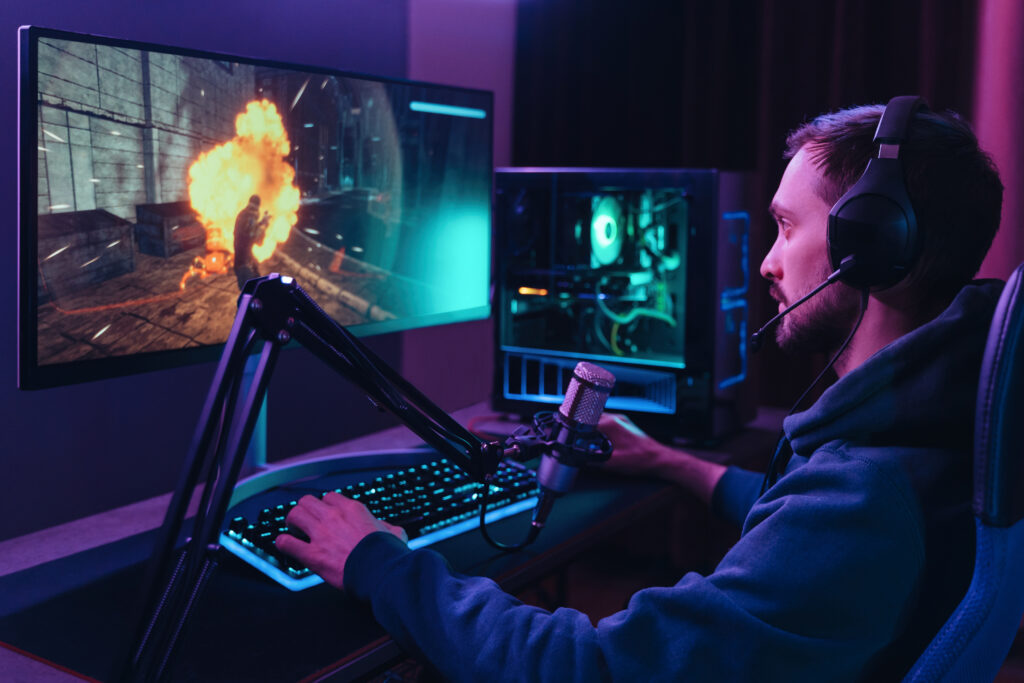
Competitive gaming requires more than just quick reflexes—it demands sharp decision-making, precise timing, and a deep understanding of strategy. Whether you’re playing a fast-paced shooter, a real-time strategy game, or a battle royale, improving your reaction time and strategic thinking can give you a major advantage over your opponents. Here’s how to train your brain, optimize your setup, and develop winning strategies.
1. Train Your Reflexes with Reaction Time Drills
Reaction time is the speed at which you respond to visual or auditory cues. The good news? You can train it. Here’s how:
- Use Reaction Time Apps: Websites like Human Benchmark or apps like Aim Lab and Kovaak’s FPS Aim Trainer offer drills specifically designed to speed up your response times.
- Practice Flick Shots and Tracking: If you play shooters, spend time in aim trainers or the game’s training mode to improve how quickly you lock onto targets.
- Play Fast-Paced Games: Even outside of your main game, rhythm games, fighting games, and arcade-style shooters can enhance reaction speed.
2. Optimize Your Gaming Setup for Faster Responses
Your hardware can slow you down if it’s not optimized for competitive play.
- Lower Your Input Lag: Use a gaming monitor with a high refresh rate (at least 120Hz) and a low response time (1ms-5ms) to make sure your actions register instantly.
- Use a Wired Connection: Wireless controllers and mice have slight delays. Switching to wired peripherals can improve reaction speed.
- Adjust Sensitivity Settings: Find a balance between high and low sensitivity that allows you to react quickly without losing precision.
- Turn Off Extra Visual Effects: Motion blur, unnecessary shadows, and post-processing effects can slow your ability to spot enemies quickly.
3. Improve Hand-Eye Coordination
Your ability to process what you see and translate it into an action is critical.
- Use Hand-Eye Coordination Exercises: Simple drills like tracking objects with your eyes, playing table tennis, or juggling can improve your ability to react quickly.
- Warm Up Before Playing: Just like athletes stretch before a game, a short 5-10 minute warm-up in an aim trainer or practice mode can get your reflexes ready.
4. Develop a Proactive Mindset Instead of a Reactive One
Reaction time isn’t just about speed—it’s about predicting what will happen next. Instead of always reacting to enemies, anticipate their moves.
- Watch High-Level Players: Studying pro players on Twitch or YouTube can help you understand how to predict enemy movements and think ahead.
- Use Sound Cues to Your Advantage: Many games have directional audio that lets you hear footsteps, gunfire, or ability use before you see the enemy. Pay attention to these clues.
- Learn Common Strategies and Player Behavior: Over time, you’ll start to recognize patterns—where enemies tend to hide, when they push aggressively, and how they move in different scenarios.
5. Strengthen Your Decision-Making Under Pressure
Quick reactions won’t help if you hesitate at key moments.
- Make Small, Fast Decisions in Other Areas: Play games that require split-second thinking, like chess puzzles, strategy games, or even card games like poker.
- Limit Overthinking: If you tend to hesitate, practice making decisions faster by setting a mental time limit. The more you act on instinct, the better you’ll perform in high-pressure situations.
- Review Your Own Gameplay: Watching replays of your matches can reveal moments where you hesitated or made the wrong choice, helping you learn from mistakes.

6. Improve Your Mental and Physical Stamina
Gaming performance is directly linked to your physical and mental well-being.
- Get Enough Sleep: Sleep deprivation slows down reaction time and weakens decision-making skills. Aim for at least 7-9 hours of rest.
- Stay Hydrated and Eat Brain-Boosting Foods: Drink plenty of water and eat foods rich in omega-3s (like fish and nuts) to keep your brain sharp.
- Take Regular Breaks: Long gaming sessions can cause fatigue, slowing your reaction time. Take short breaks to stay fresh.
7. Master the Art of Adaptability
Every match is different, and rigid strategies won’t always work. Being adaptable will help you stay ahead.
- Change Tactics Mid-Game: If something isn’t working, don’t keep forcing it. Adjust your strategy based on how the match is going.
- Learn Multiple Playstyles: Being able to switch between aggressive and defensive strategies makes you harder to predict.
- Stay Calm Under Pressure: If you panic in clutch moments, practice deep breathing techniques to keep your focus sharp.
Final Thoughts
Improving reaction time and strategy in competitive games takes consistent practice, the right mindset, and a well-optimized setup. By training your reflexes, making smarter decisions, and staying mentally sharp, you’ll see noticeable improvements in your performance. Competitive gaming is as much about mental strength as it is about raw skill—stay patient, keep learning, and watch your game reach the next level.
